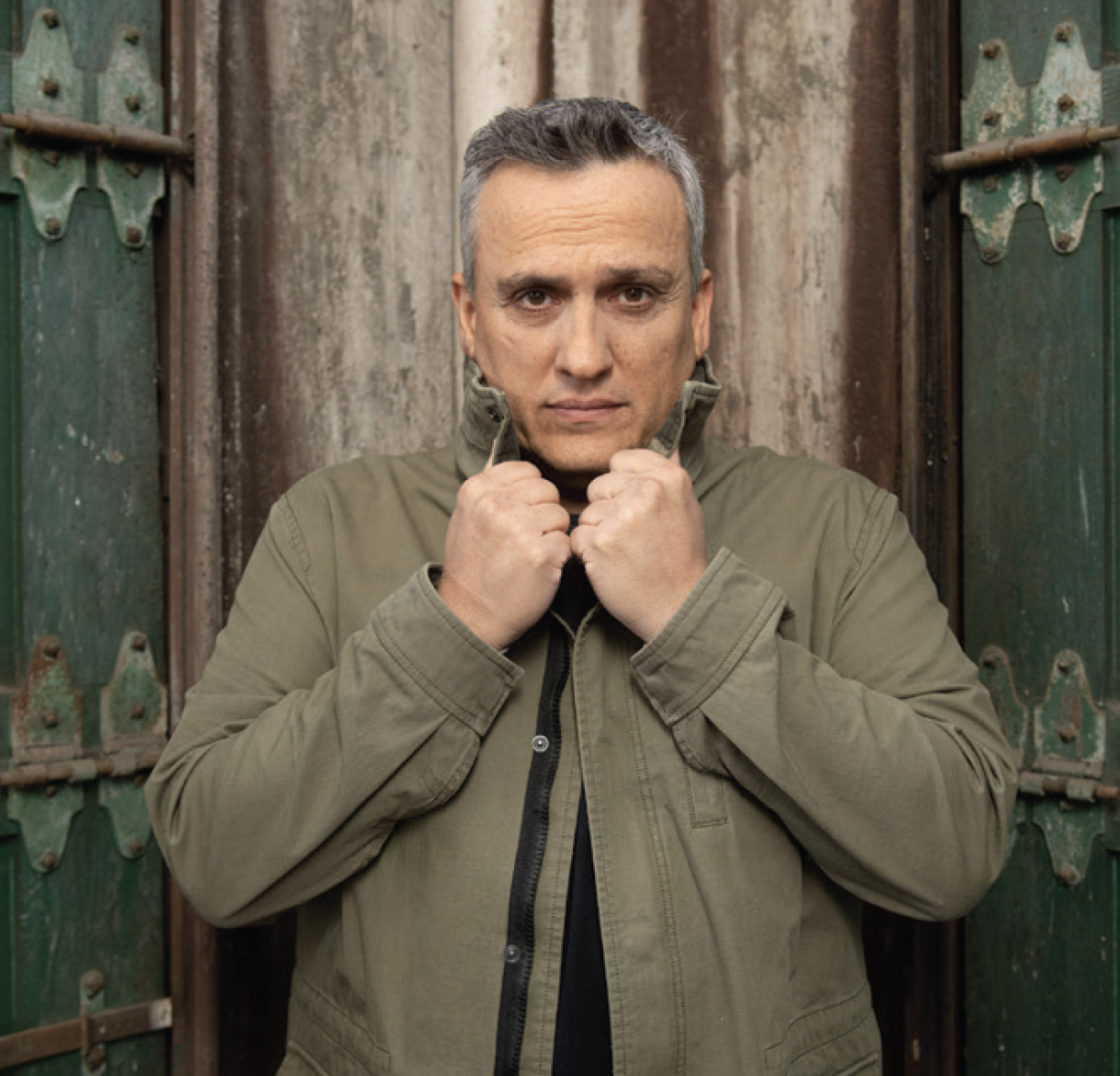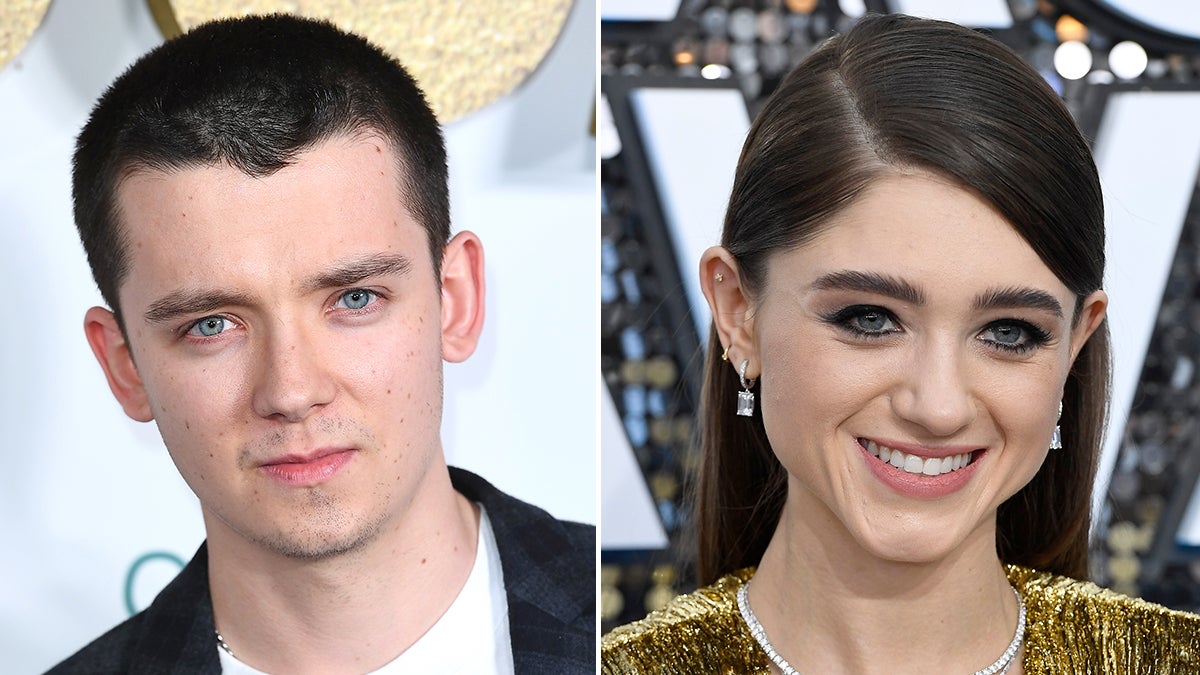Produced By Magazine
The AGBO Method: All Systems Go for AGBO
Anthony and Joe Russo and Mike Larocca’s production company is changing with the Hollywood landscape, serving inclusive, artist-first blockbuster projects with an indie spirit.
Written by Dino-Ray Ramos | Photographed by Kremer Johnson

The Russo Brothers have been synonymous with the Marvel Cinematic Universe and are arguably the duo responsible for making the expansive superhero saga what it is today. From Captain America: Civil War to Avengers: Endgame, Anthony and Joe Russo could have easily ridden that blockbuster wave of cinematic spectacle. Although they continue to keep that mentality, they created their artist-first production company, AGBO, to level up on their own terms and to bolster talent across the board.
With former Chernin Entertainment Senior VP Mike Larocca steering the AGBO ship as co-founder, the trio are not only sculpting the Hollywood landscape with the way they make global content for film, television, and digital platforms, but are also allowing themselves to change with it.
Nestled in downtown Los Angeles in an area that once served as food distribution hub for the city, AGBO blends in with discreet brick buildings that that include a number of restaurants. Among them is chef Steve Samson’s Rossoblu, where the Russo brothers and Larocca first met.
The AGBO campus has Silicon Valley start-up energy and is filled with a determined artistic vibe as well as contemporary Instagrammable Easter eggs throughout. Across the way is a sizable parking lot that played host to a drive-in presentation of Spider-Man: Homecoming in the early days of the pandemic. The growing inside of the campus includes several state-of-the-art editing suites, a viewing theater, a huge work-inprogress motion capture studio, and true to the LA spirit, kombucha on tap.
THE AGBO ORIGIN STORY
AGBO may be flourishing, but in 2015, when it was originally incepted by the Russo brothers, it was just a glint in their eyes. The production company was named Getaway then. It officially launched as AGBO in 2017 (the name derives from “Gozie Agbo,” a handle Joe Russo has used as an actor in Marvel films). As Larocca remembers, “Joe and Anthony were just coming off of Winter Soldier, and right when we started, they were headed off to Atlanta for Civil War.”
The then-Getaway production banner made a deal with Sony for the Russos’ action thriller The Gray Man, which would go on to star Ryan Gosling. The Russos and Larocca had great reputations and were linked to huge Hollywood projects, but it wasn’t all glamorous for them. Joe says that they were working out of a modest bungalow at Sony—but Larocca remembers differently:
“It wasn’t even a bungalow. We had like the worst office and these guys were making Civil War and now here we are six years later with a billion-dollar valuation, eight or 10 movies, and billions of dollars in production budget. So it’s been a pretty insane six years.”
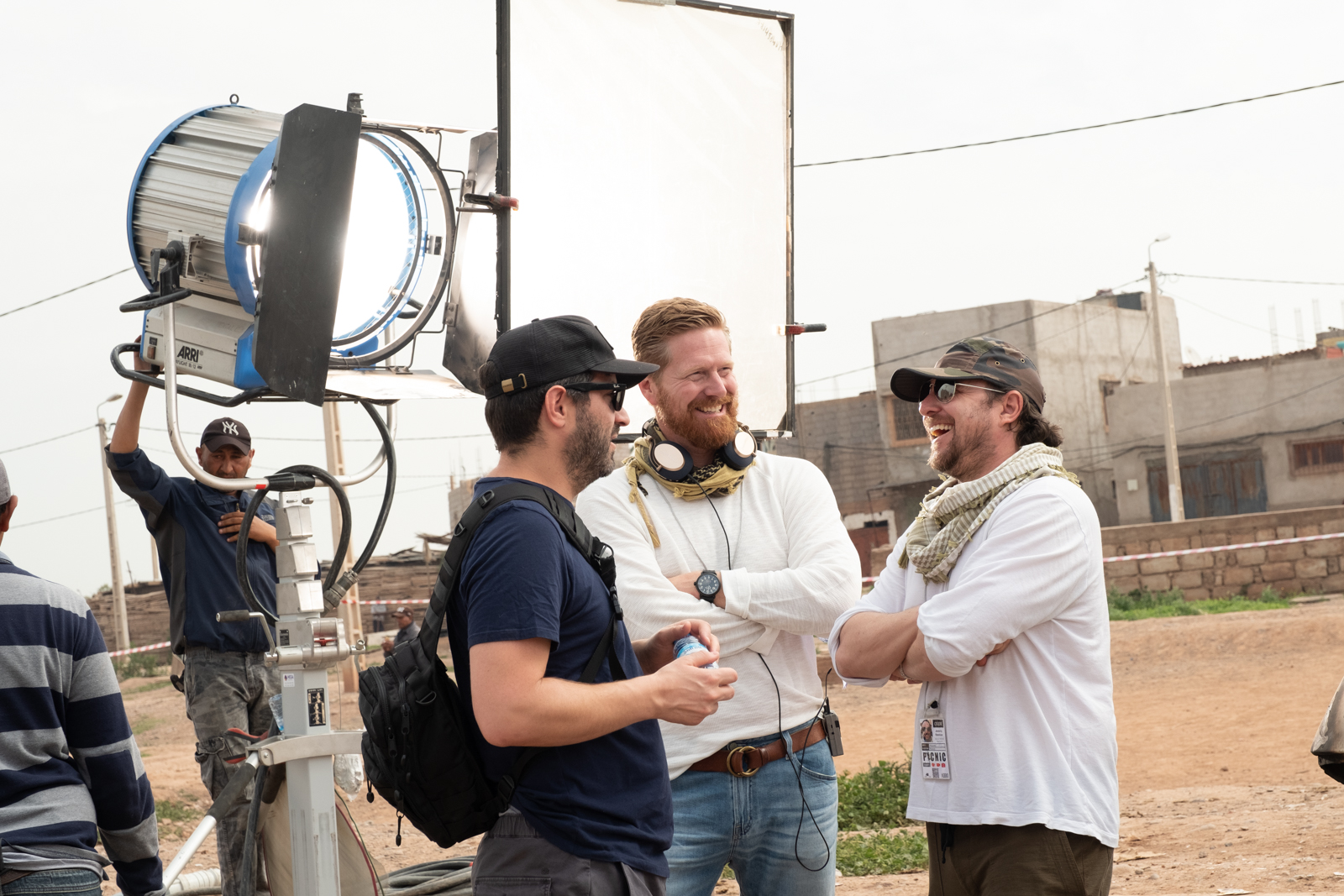
“I THINK IT’S IMPORTANT TO NOTE WE ARE AN ARTIST-LED COMPANY. IT FUNCTIONS LIKE AN ARTIST COLLECTIVE. THAT’S HOW WE DEVELOP OUR MATERIAL. THAT’S HOW WE COLLABORATE WITH OTHER ARTISTS. IT’S VERY MUCH BASED ON THAT MODEL, WHICH I THINK IS DISTINCTLY DIFFERENT FROM THE NORMAL STUDIO MODEL.”—ANTHONY RUSSO
THE CHOSEN ONE
Choosing Larocca to head AGBO seemed like a no-brainer for the Russos. As the vice chair, Larocca has served as the producer on four of the production company’s projects including Extraction, Mosul, Relic, 21 Bridges, and Cherry. He also serves as producer on The Gray Man as well as the forthcoming Electric State and Citadel on Amazon.
That said, he’s doing pretty well as the captain of the AGBO ship.
“Joe and I have worked together for so long that we got to the point where we realized we needed a partner who was an incredible producer in order to sort of dimensionalize ourselves and continue to grow and thrive as filmmakers,” says Anthony. “For us it was a big choice—it’s introducing someone new to our dynamic—and we were very thoughtful about it.”
He continues, “We took a long time exploring people who could potentially be that kind of a partner to us, and we were led by many roads to Mike. It just ended up feeling right.”
“I think we complement each other really well,” Joe says of Larocca. “We all have different strengths, so I think it’s important as a director to feel supported and have a partner who can take responsibilities off your shoulders—someone you trust implicitly to manage issues from start to finish. I mean, that’s two years of hard work. We make movies at a large scale. They’re very complex, and the machinations and the politics behind them are very complex. It requires a very, very proficient, well-respected partner who can pick up the phone and talk to studios and solve problems.”
After coming on board, Larocca wanted to help parlay the Russos’ brand and success into producing. The brothers had produced a couple of projects but hadn’t yet grown in the space with the strength of the Marvel movies.
“It was about starting to make things that we could be proud and excited about,” says Larocca. “I’d been working with Peter Cherin’s company since its inception, so I think I had a sense of what it takes to get something going. Like Joe and Anthony, Peter had every advantage in the world to be successful as a producer—but it’s still incredibly hard work.”
Larocca came in ready to work. He rolled his sleeves up and made great things—which ballooned into many more projects. “The ambition of where we ended up isn’t what we talked about in the beginning, but they’re unbelievably entrepreneurial partners, and a lot of opportunities came our way,” says Larocca. “I think we’ve done a good job taking advantage of them and growing the business—much bigger, I think, than what I was anticipating from the jump.”
A PRODUCER’S JOB IS NEVER DONE
Anthony and Joe Russo may be known for their MCU work, but they have also floated effortlessly back and forth from indie films like their first feature Welcome to Collinwood to cult TV projects like Community to big blockbusters on the big screen.
The Russos’ road to cinema was embedded with storytelling, and Anthony says that from his earliest memories of movies, it was a language that resonated with him.
“The communication that was happening through storytelling sometimes felt more resonant to me than what was happening in my real life,” says Anthony. “I remember coming to that moment when I felt like I had a fluency. In a way, I can communicate through film more effectively than I can in other ways in my life.”
The brothers had storytelling flowing through their veins and through their career. They could craft a story. That naturally dovetailed into their roles as producers—something that Larocca helped bring forward.
“What does a producer do?” is a question they often get asked.
“There’s a misconception that producing has to do strictly with financing or the business elements. But I think it’s pretty evident what everyone in film does if you think about it,” Larocca points out. ”If the actors act and the directors direct, the producers produce—literally.
“Producers make it happen. They put the elements together, push it through, and literally produce it into the world. For whatever reason, some people don’t understand how all-encompassing the producer role is.”
Anthony admits that his and Joe’s first taste of producing was with their first feature Welcome to Collinwood. “We had written it and were directing it, and there was nobody else working with us, so we were by default producing it. That was basically how we learned what producing is.” Joe chimes in to say that they had seen other people take the written by, directed by, and produced by credit, so they followed suit.
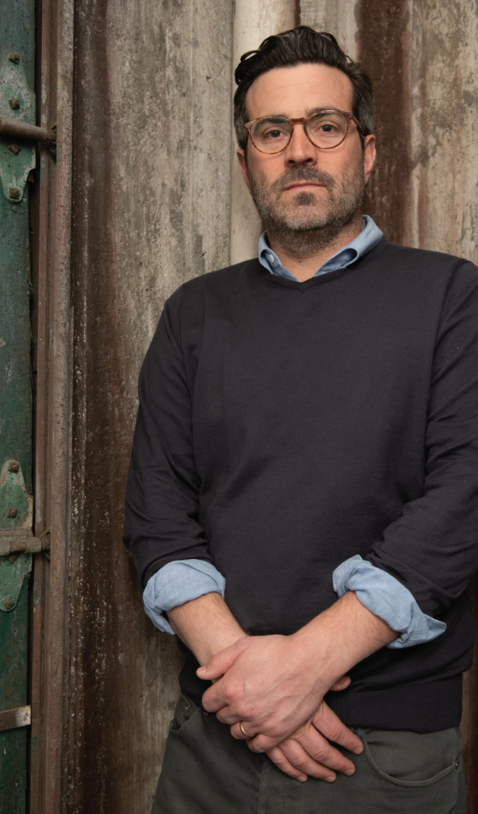
“WE HAD LIKE THE WORST OFFICE AND THESE GUYS WERE MAKING “CIVIL WAR,” AND NOW HERE WE ARE SIX YEARS LATER WITH A BILLIONDOLLAR VALUATION, EIGHT OR 10 MOVIES, AND BILLIONS OF DOLLARS IN PRODUCTION BUDGET. SO IT’S BEEN A PRETTY INSANE SIX YEARS.” —MIKE LAROCCA
“That was a great experience for us because we were pretty much doing everything,” says Anthony. “We had to learn everything on that film, including producing. That’s when we understood what Mike was talking about—there’s nothing there unless there’s somebody there making it happen.”
“It’s so funny because the details, scale, and time can change but at the end of the day, it’s all the same. It’s making sure everybody shows up, making sure you’ve got the equipment, making sure everybody knows what story you’re telling, making sure the money’s there to pay for it all. That’s it.”
MCU IN AGBO
From Community to the MCU to AGBO, the Russos are all about keeping it in the family. We’ve seen Community cast members like Jim Rash, Ken Jeong, Danny Pudi and Yvette Nicole Brown appear in Marvel movies, while such actors as Chris Hemsworth, Tom Holland and the late Chadwick Boseman have appeared in their AGBO projects like Extraction, Cherry and 21 Bridges.
For the Russo Brothers, it’s not about branding or separating projects. They reject the notion of “auteur” and lean into the “collective theory,” which champions collaboration.
“I don’t know that we make very conscious decisions about branding or separation. We just go to work every day,” Joe says. “We like to work a lot. We come from sort of a blue-collar background. Our grandpa worked in the steel mills until he was 80. So it’s always been about the work for us. It’s what excites us to get out of bed every day and can justify leaving your family for 12, 13 hours a day.”
Because they have worked in a diverse array of spaces in film and TV, the Russo brothers’ career has been very unorthodox, paralleling that of Steven Soderbergh, their mentor during their indie days.
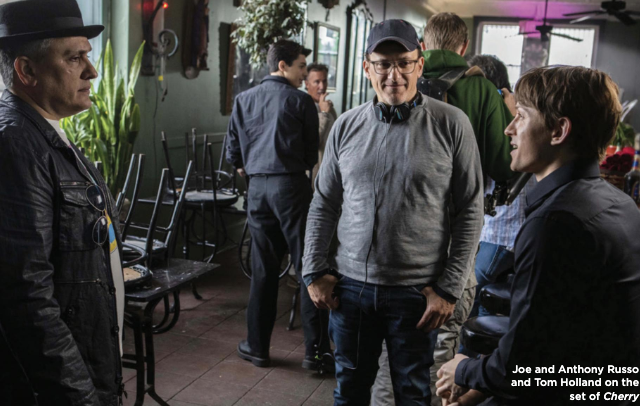
“We flow all over the place depending on what is exciting to us in the moment. It was never a conscious decision to separate AGBO so much as to create a space where creatives feel protected—to make this feel like a collective and to pay our karmic debt to the universe by getting some young filmmakers,” Joe adds.
This has flowed through their work veins from the jump. The Russo brothers codified a process with their MCU collaborators Steve McFeely and Christopher Markus that they brought to Marvel co-presidents of story, where the four of them would sit in a writers room, spend months breaking story, and then work on an outline. “Then we’d spend months talking about the outline, making sure we liked the structure and direction of the story. Then we’d go to a script and we’d sit and read the script line by line in the room,” says Joe.
For four years, they used this disciplined process at Marvel. If Marvel boss Kevin Feige would pop his head into the room and say, “I need a script for Civil War, ” they would use the process to crank one out in a couple of months.
Finding this incredibly effective, the Russo brothers asked, “What if we built a studio around this?” Fast-forward to 2022, and they have a billion dollars’ worth of projects in production.
“We’re very, very busy and we feel like it’s still a lean company,” says Joe. “Everybody wears multiple hats. I think our process has made it very efficient for us to tell stories of quality.”
BLOCKBUSTER MINDSET, INDIE SPIRIT
As mentioned, the Russo brothers got their start in indie film and thrived in cult TV series. That spirit continues to be present in their projects all the way to Endgame.
The Russos and Larocca manage to achieve a balance of studio films with an indie aura that no one else can quite get. Sure, a film like Cherry has Tom Holland, but it frames him in a story that gives off Sundance energy.
“We have certainly made films here that are indie in spirit and execution,” Larocca says. “Then we made Mosul, which is an Arabic language film that we financed in its entirety for under $15 million. We’ve done the Daniels film (Everything Everywhere All at Once) with A24; we’re executive producers on another film at A24 called Legend of Ochi; and we did the horror Relic with a first-time director from Australia. So we’ve definitely kept a foot in indie spirit.”
“I think it’s important to note we are an artist-led company,” says Anthony. “This company doesn’t function like a studio; it functions like an artist collective. That’s how we develop our material. That’s how we collaborate with other artists. It’s very much based on that model, which I think is distinctly different from the normal studio model.”
Larocca says that they were lucky to not have quotas or output requirements from their partners over the years. He thinks this comes with the territory of being independent. However, he still feels the need for a sense of urgency when pushing projects forward—but he insists that things have to be fully baked and not rushed.
“That said, we’ve capitalized the company,” he says. “We love making movies.”
CHANGING WITH HOLLYWOOD
With the pandemic, a racial reckoning and outdated practices, Hollywood is changing no matter what. AGBO has been impacted by some of this change and has been adapting.
They were lucky to dodge the COVID shutdown with their productions of Everything Everywhere All at Once and Cherry. However, they had to get into the COVID-filmmaking mindset with The Gray Man, Citadel and Extraction 2— but they got the job done.
When it comes to films, streamers have thrown a wrench into how the box office works, and AGBO is also adjusting to that. Joe waxes poetic on how things like box office numbers and Nielsen ratings are becoming more and more outdated metrics. Meanwhile, streamers like Netflix have offered compelling things to the landscape.
“One is diversification—it was certainly a white man’s game for a very long time but streamers’ specificity of appealing to regional markets has pushed diversity agendas toward the industry as a whole, and now we’re getting more inclusive stories. We’re getting them on a greater platform.”
He looks to Squid Game as an example. The critically acclaimed pop culture phenomenon would not have the impact it did if it had been released 10 years ago.
“I think audiences are changing,” he says. “They’re not afraid of reading subtitles, and streamers can take bigger bets on something like a Squid Game because they don’t have to worry about the blowback from an opening weekend, or box office numbers that color the public’s perception. I think we’re in a great place.”
The Russo brothers’ embrace of diversity comes from an upbringing in an Italian immigrant family. The two also grew up in Ohio near an arthouse cinema called the Cleveland Cinematheque, which played a variety of foreign films. So they have always been multicultural in their thinking. Even their time at Marvel allowed them to travel the world and connect with a global audience.
“I hope this doesn’t sound navel-gazey, but I feel like AGBO was way ahead of that curve,” Anthony says. “The fact that our very first movie would be an entirely Arabic-language film set in Mosul with an entirely Middle Eastern cast at the budget we were at—there was no other company in the world that would’ve made that movie in that way.”
For AGBO, it’s about figuring out how to make cultures feel seen, and getting excited about it.
“It’s this opportunity to make things you never thought you’d get a chance to make—to work across a language barrier,” adds Larocca. “And the globalization of all this is incredibly exciting and fun to work in. We’ve embraced it as a company for the simple reason that we were interested in it.”
As AGBO looks to bolster inclusion, they also see it as an opportunity to tell even more stories outside their regular purview.
“WHAT WE LIKE ABOUT STORYTELLING IS THAT IT BUILDS COMMUNITY AND CAN BE INCLUSIVE WHEN YOU TELL THE RIGHT STORIES. IT DOESN’T MATTER WHAT SIDE OF THE AISLE YOU’RE ON. IT DOESN’T MATTER WHAT RACE, COLOR, CREED. PEOPLE ARE IN A THEATER, LAUGHING, CHEERING AND RESPONDING. THAT’S THE POWER OF STORYTELLING.” —JOE RUSSO
“What we like about storytelling is that it builds community and can be inclusive when you tell the right stories,” says Joe, adding that releasing Spider- Man: No Way Home during the pandemic helped build a community.
“I was proud of that movie bringing people together,” adds Joe. “It doesn’t matter what side of the aisle you’re on. It doesn’t matter what race, color, creed. People are in a theater, laughing, cheering and responding. That’s the power of storytelling.”
AGBO AND THE FUTURE
With so much growth, Larocca and the Russo brothers are obviously looking to the future of AGBO. At the beginning of 2022, the company closed a sizable investment deal with Asia-based video game maker Nexon that would allow them to develop films or series from Nexon’s extensive catalog of game titles. The deal will also allow Nexon to build out game extensions based on AGBO titles.
It seems on brand for AGBO.
“We spent a lot of time over the past couple years building our company. In addition to all the things we’ve talked about, we are looking for it to be a place that can be a ‘plug-and-play franchise universe creator,’” says Larocca about the deal. “To us, audiences want to engage with more than just one film, and if it’s successful, they don’t want to wait for three years.”
With Joe and Anthony’s ability to team with Christopher Markus and Stephen McFeely to build unique, interlocking universes and franchises, this is a huge step for AGBO. Larocca says that we will see this in the Extraction franchise. Along with the sequel, AGBO is talking about creating spinoffs. This also goes for The Gray Man and Citadel.
Larocca says that a huge focus for AGBO is to present complete worlds and universes while being at the cutting edge of the technology that will make it more and more possible.


